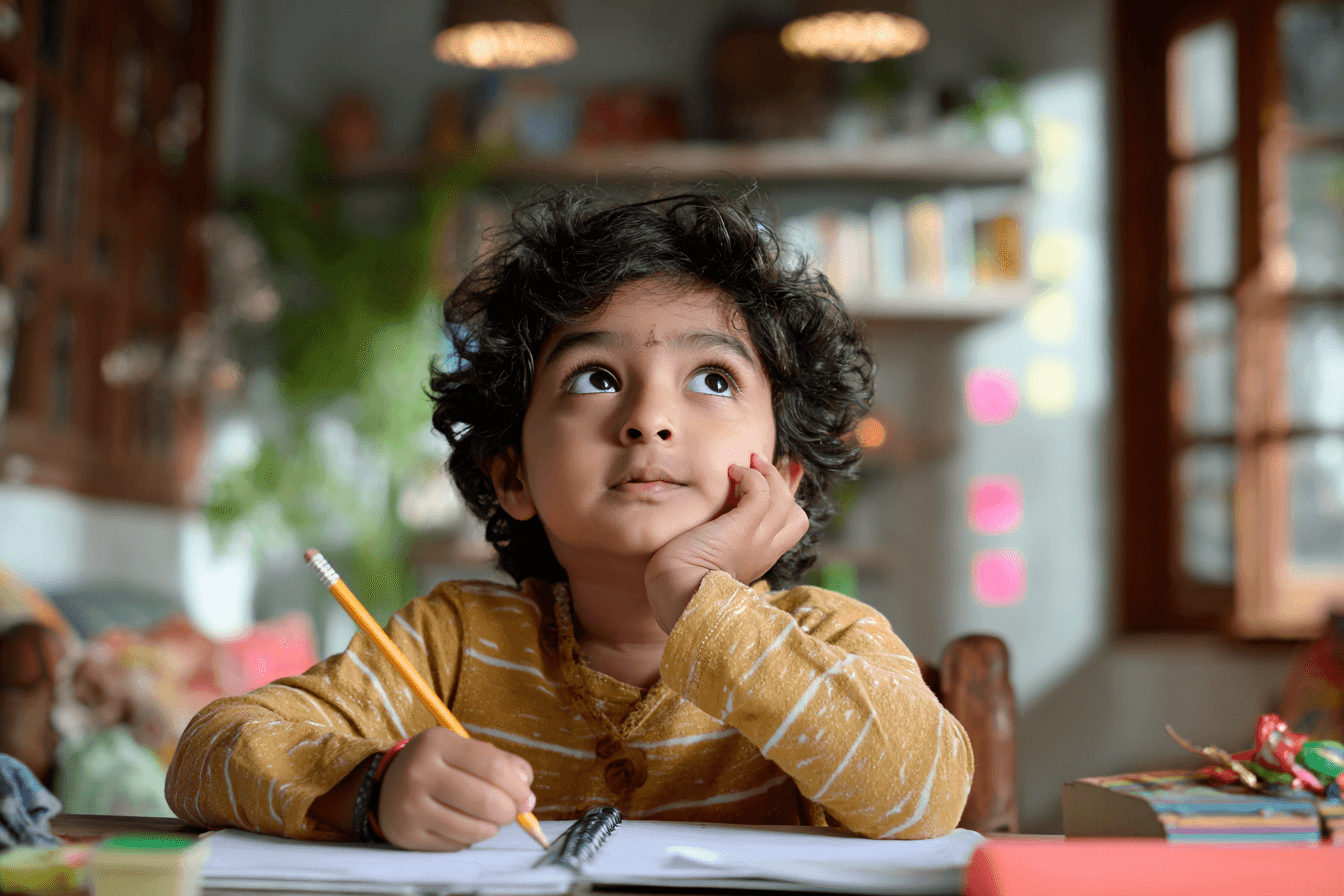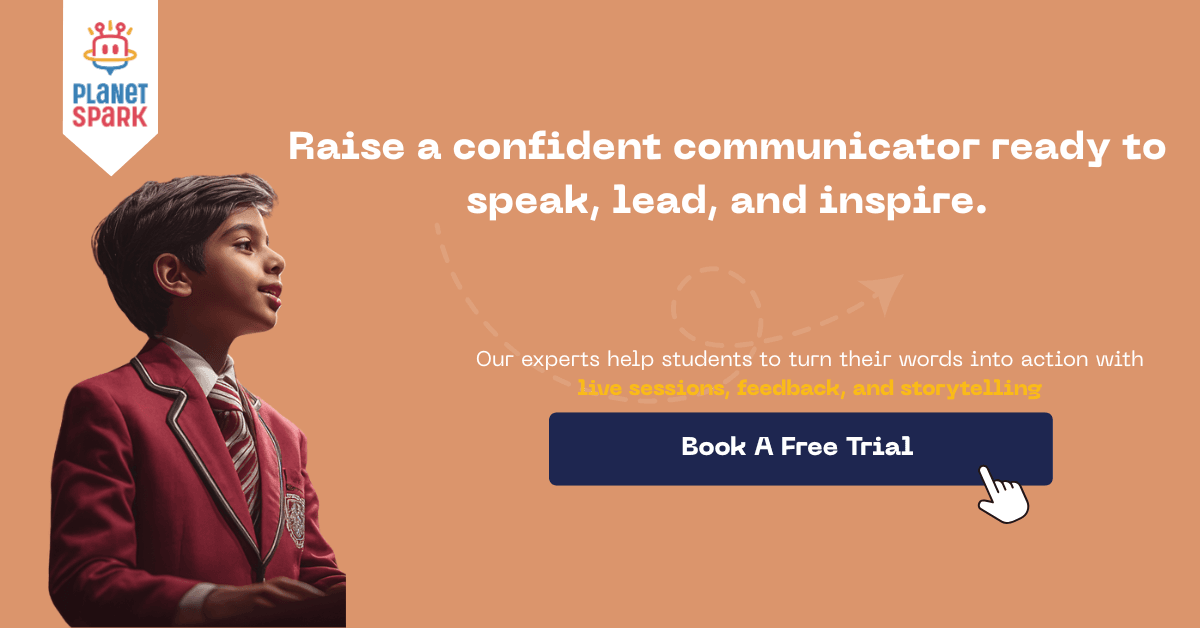Confidence Building for Kids: Why Class 6 Is the Right Time
Last Updated At: 22 Jul 2025
11 min read

Table of Contents
- Why Confidence Building for Kids Matters at This Age
- Signs Your Child May Need Confidence Building Support
- Practical Confidence Building Activities for Class 6 Kids
- Confidence Building Games for Kids
- Classroom Confidence Building Activities
- Common Challenges Faced by Class 6 Students (And How Confide
- How PlanetSpark Helps Kids Build Confidence
- Conclusion
- FAQs on Confidence Building for Class 6 Kids
Confidence is one of the simplest yet most powerful skills a child can learn. It helps them speak up, try new things, and handle both success and failure with resilience.
A confidence-building course for kids teaches more than just public speaking. It nurtures mindset, emotional strength, and social readiness. Platforms like PlanetSpark create spaces where children practise these skills in everyday interactions.
In this blog, you’ll discover why confidence matters for Class 6 students, explore activities to build self-esteem, and learn how early confidence training can shape a child’s future.
Why Confidence Building for Kids Matters at This Age
Let’s start with why this is important in the first place.
Around the age of 11 or 12, children enter a phase where they become more self-aware. They compare themselves to others, worry about fitting in, and sometimes doubt their abilities. These are normal experiences, but without the right support, they can lead to low self-esteem.
Confidence works as a protective shield. It helps kids believe in themselves and face challenges with courage. When children build confidence early, they are more likely to:
- Participate actively in class
- Take the lead in group projects
- Handle peer pressure with ease
- Express ideas clearly without fear of judgment
- Try new activities without worrying about failure
Children who lack confidence may hold back from participating, avoid social situations, or hesitate to try new things. This is why confidence-building for kids is so important at this stage.
Developing these skills early helps kids build resilience and prepares them for teenage years and beyond. Confident kids grow into capable, independent individuals who are ready to take on life’s challenges.
Signs Your Child May Need Confidence Building Support
Every child has moments of insecurity, but some signs suggest a child may need extra support in building self-confidence. Here are a few to watch for:
- Avoiding new situations or refusing to try new things
- Being overly self-critical or using negative self-talk like “I can’t do this”
- Struggling with peer interactions or avoiding group activities
- Displaying nervousness when speaking in front of others
- Comparing themselves constantly to classmates or siblings
- Giving up easily when faced with small setbacks
If you notice these behaviours often, your child may benefit from structured confidence-building activities.
Unlock Your Child’s Potential
Give them the tools to speak, lead, and grow. Book a Free Demo Now!
Practical Confidence Building Activities for Class 6 Kids
Learning confidence doesn’t have to be boring or stressful. Interactive activities make the process fun and memorable.
Here are some activities you can try at home or in school:
Building confidence is not something that happens overnight. It takes regular practice, positive reinforcement, and the right set of activities. If you are wondering how to help your child become more confident, start with simple exercises that feel natural and fun.
Here are some of the best confidence building activities for kids in Class 6.
Storytelling and Role-Play

Children often struggle with public speaking because they worry about being judged. Storytelling and role-play can help remove this fear by making the process fun. When kids tell stories or act out different scenarios, they get a chance to practise speaking clearly, using expressive body language, and thinking on their feet.
How to try this at home:
Ask your child to pretend they are a news anchor delivering the day’s headlines. Another idea is to let them give a pretend speech as the school captain or lead a family meeting. These playful activities help children get used to speaking in front of others without pressure.
Why it works:
Storytelling boosts creative thinking while also improving communication. Role-play teaches kids how to adjust their tone, use eye contact, and build confidence while presenting ideas.
Journaling Positive Experiences

Many children focus on what they did wrong or where they made mistakes. Journaling helps shift this mindset. When kids write down three things they did well each day, they start noticing their strengths instead of worrying about failures.
How to try this at home:
Keep a special notebook just for this exercise. Every night, ask your child to jot down moments when they felt proud, no matter how small. Maybe they answered a tough question in class, helped a friend, or tried something new.
Why it works:
This habit builds self-awareness and teaches children to appreciate their own efforts. Over time, it rewires their thinking to focus on growth and progress.
Group Discussions

Confidence is not about talking non-stop. It is about knowing when and how to share thoughts while also listening to others. Group discussions help children practise expressing ideas clearly while respecting different opinions.
How to try this at home or in class:
Pick a topic your child is interested in, like their favourite movie, a book they have read, or a current event. Ask open-ended questions such as, "What did you like about it?" or "How would you have handled that situation differently?"
Why it works:
Group discussions encourage respectful communication. Children learn to organise their thoughts, speak with clarity, and listen without interrupting. These are core parts of confidence-building for kids, especially at this age.
Goal-Setting Exercises

Setting and achieving small goals is one of the fastest ways to build self-confidence. It teaches children that effort leads to success, and progress matters more than perfection.
How to try this at home:
Help your child pick a simple, measurable goal. For example:
- "I will read for 20 minutes every day this week."
- "I will try one new hobby this month."
- "I will practise speaking in front of the mirror for five minutes each day."
Once they reach the goal, celebrate their success with praise or a small reward.
Why it works:
Goal setting teaches kids discipline, time management, and the joy of accomplishment. Even small wins add up, making them feel capable and ready for bigger challenges.
Confidence Starts with Practice
Try a session and see the difference. Book Now!
Body Language Practice

Confidence is not just about what kids say. It is also about how they carry themselves. Body language can communicate assurance and presence even before a child speaks.
How to try this at home:
Play a mirror game where you and your child practise standing tall, making eye contact, smiling naturally, and using hand gestures while talking. You can turn this into a role-play game too. For example, pretend your child is introducing themselves at a new school or presenting an award.
Why it works:
Non-verbal cues like posture and eye contact make children feel and appear more confident. With practice, these habits become natural, helping your child succeed in interviews, presentations, and everyday conversations.
Why These Activities Matter?
These confidence building activities for kids in Class 6 are not just about learning to speak up or smile more. They teach life skills. Whether it is dealing with peer pressure, giving a class presentation, or making new friends, confident children handle challenges with resilience.
By practising these exercises regularly, children develop a growth mindset. They learn to view mistakes as learning moments, celebrate their progress, and approach the world with curiosity and courage.
Confidence Building Games for Kids
Games are a great way to teach life skills while keeping children engaged. Here are a few examples:
1. Describe and Show
Ask your child to pick a favourite object and describe it to you in five sentences. This improves vocabulary, memory, and confidence in speaking.
2. Who’s the Leader?
One child acts as the leader, performing actions while others follow. This game teaches observation, leadership, and teamwork.
3. Chinese Whisper
Children sit in a circle and pass a whispered message around. This game teaches listening skills, clarity in communication, and patience.
4. 20 Questions
One child thinks of an object, person, or place. Others ask up to 20 questions to guess what it is. This game encourages critical thinking and teamwork.
5. Back-to-Back Drawing
Two children sit back to back. One describes an object or image, and the other tries to draw it based only on the description. This builds listening and communication skills.
Classroom Confidence Building Activities
In school, teachers can integrate confidence-building exercises into the daily routine. Here are a few ideas:
Presentations on Favourite Topics: Let students speak about something they love.
Debate and Discussion Clubs: Teach respectful disagreement and critical thinking.
Peer Compliment Circles: Students share positive feedback with each other.
Public Reading Practice: Reading aloud improves fluency and public speaking skills.
Drama and Theatre Activities: Performing in front of peers builds courage and stage presence.
Book a Free Trial Class Today!
Help your child take the first step toward confidence.
Common Challenges Faced by Class 6 Students (And How Confidence Building Helps)
Class 6 is a transitional stage where children experience new academic and social pressures. They are no longer the youngest in school, but they are also not yet teenagers. This in-between phase often brings unique challenges.
Here is a look at some common difficulties faced by Class 6 students and how a confidence building course for kids can help overcome them:
| Challenges | How Confidence Training Helps |
|---|---|
| Fear of Public Speaking | Confidence courses teach step-by-step techniques to present ideas clearly. Students learn to organise their thoughts, practise their speeches, and speak without fear. |
| Low Participation in Class | Through regular practice and positive reinforcement, kids are encouraged to share their opinions and ask questions. This builds classroom engagement and reduces hesitation. |
| Social Awkwardness | Confidence activities focus on improving interpersonal skills. Kids learn conversation starters, practice empathy, and become more comfortable in group interactions. |
| Fear of Failure | Confidence training introduces the concept of a growth mindset. Children learn that failure is part of learning, and they become more resilient when things don’t go as planned. |
| Difficulty Making New Friends | Courses include collaboration exercises that help children practise teamwork, listen actively, and support others. These activities make socialising easier and more enjoyable. |

How PlanetSpark Helps Kids Build Confidence
At PlanetSpark, confidence is built step by step through consistent practice and real-life communication activities. The focus is on helping children grow naturally, without pressure.
Here’s how PlanetSpark supports your child’s confidence journey:
Interactive 1:1 Classes: Children get personalised attention from expert trainers who understand their unique needs.
Engaging Activities: From storytelling to debates, kids practise speaking, listening, and expressing themselves in different situations.
Real-Life Scenarios: Role-play, group discussions, and creative presentations help children handle everyday social situations with ease.
Positive Reinforcement: Trainers encourage progress, celebrate small wins, and help children learn from mistakes without fear.
These small steps together help kids gain the confidence to speak up, lead, and succeed.
Conclusion
Confidence is one of the most valuable skills a child can develop. For Class 6 students, it helps in academics, friendships, and daily decision-making. A confidence building course for kids gives them tools to speak up, handle challenges, and believe in their abilities. With the right support at home and structured learning programs, children can build lasting self-esteem and resilience that will help them throughout life.
People also read:
Personality Development Activities for Kids | Speaking Skills in Communication
FAQs on Confidence Building for Class 6 Kids
1. Why is confidence important for Class 6 students?
At this age, children face social and academic pressures. Building confidence helps them participate actively in class, handle peer interactions better, and try new things without fear of failure.
2. What is a confidence building course for kids?
A confidence building course teaches children how to express themselves clearly, handle social situations, improve public speaking, and develop resilience. It’s about creating a growth mindset and reducing self-doubt.
3. How can I help my child become more confident at home?
Encourage your child to set small goals, praise their efforts, let them make decisions, and create opportunities for public speaking or role-play. Journaling, reading aloud, and positive conversations also help.
4. Are there online confidence-building classes for Class 6 children?
Yes, programs like PlanetSpark offer online confidence-building classes for kids. These sessions include activities like storytelling, debates, and interactive games that improve speaking skills and boost self-esteem.
5. Can confidence really be taught?
Absolutely. Confidence is a skill just like reading or writing. With practice, support, and the right environment, children can develop it over time.
6. What activities build confidence in 11 to 12-year-olds?
Activities like storytelling, group discussions, goal setting, role-play, and body language practice help children gain confidence. These activities make learning social and communication skills fun and natural.
7. What if my child is very shy?
Shyness is normal, and with patience and practice, even the quietest children can grow more confident. Start with small steps like speaking in front of family, then gradually introduce them to bigger social situations.
8. How long does it take to build confidence in kids?
Every child is different. Some may show progress in a few weeks, while others may take longer. Consistency, encouragement, and practice are key to long-term confidence development.
Personalized Communication Report
Record a video to get a AI generated personalized communication report for your child
Select Learner's Class
